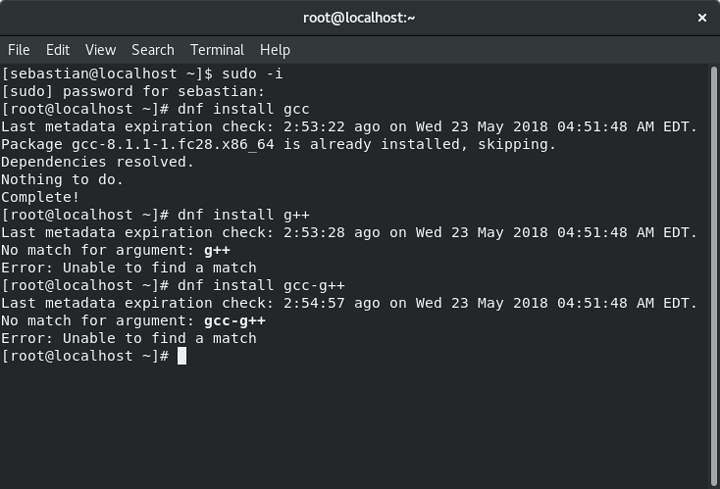I think I got pkg-config through “C Development Tools and Libraries”, but note that this tries and fails to install “pkgconfig”. Either that or “redhat-lsb” installed it.
Edit… found it.
fed.28@zero:~$ dnf info pkgconf-pkg-config
Last metadata expiration check: 0:51:10 ago on Sat 12 May 2018 05:25:54 PM EDT.
Installed Packages
Name : pkgconf-pkg-config
Version : 1.4.2
Release : 1.fc28
Arch : x86_64
Size : 3.0 k
Source : pkgconf-1.4.2-1.fc28.src.rpm
Repo : @System
From repo : fedora
Summary : pkgconf shim to provide /usr/bin/pkg-config
URL : http://pkgconf.org/
License : ISC
Description : This package provides the shim links for pkgconf to be automatically
: used in place of pkgconfig. This ensures that pkgconf is used as
: the system provider of pkg-config.
fed.28@zero:~$ dnf info pkgconf
Last metadata expiration check: 0:47:08 ago on Sat 12 May 2018 05:25:54 PM EDT.
Installed Packages
Name : pkgconf
Version : 1.4.2
Release : 1.fc28
Arch : x86_64
Size : 60 k
Source : pkgconf-1.4.2-1.fc28.src.rpm
Repo : @System
From repo : fedora
Summary : Package compiler and linker metadata toolkit
URL : http://pkgconf.org/
License : ISC
Description : pkgconf is a program which helps to configure compiler and linker flags
: for development frameworks. It is similar to pkg-config from freedesktop.org
: and handles .pc files in a similar manner as pkg-config.fed.28@zero:~/solfege-3.22.2$ sudo dnf groupinstall "C Development Tools and Libraries"
Last metadata expiration check: 0:26:22 ago on Sat 12 May 2018 05:28:14 PM EDT.
Group 'C Development Tools and Libraries' is already installed.
No match for group package "pkgconfig"
fed.28@zero:~/solfege-3.22.2$ sudo dnf install redhat-lsb texinfo pygtk2-devel
fed.28@zero:~/solfege-3.22.2$ configure
checking for gcc... gcc
checking whether the C compiler works... yes
checking for C compiler default output file name... a.out
checking for suffix of executables...
checking whether we are cross compiling... no
checking for suffix of object files... o
checking whether we are using the GNU C compiler... yes
checking whether gcc accepts -g... yes
checking for gcc option to accept ISO C89... none needed
checking for a Python interpreter with version >= 2.5... python
checking for python... /bin/python
checking for python version... 2.7
checking for python platform... linux2
checking for python script directory... ${prefix}/lib/python2.7/site-packages
checking for python extension module directory... ${exec_prefix}/lib64/python2.7/site-packages
checking how to run the C preprocessor... gcc -E
checking for headers required to compile python extensions... found
checking for a BSD-compatible install... /bin/install -c
checking whether make sets $(MAKE)... yes
checking for swig... no
checking for lilypond... no
checking for bzr... notfound
checking for gs... /bin/gs
checking for xgettext... /bin/xgettext
checking for msgfmt... /bin/msgfmt
checking for msgmerge... /bin/msgmerge
checking for msggrep... /bin/msggrep
checking for makeinfo... /bin/makeinfo
checking for sed... /bin/sed
checking for cat... /bin/cat
checking for pkg-config... /bin/pkg-config
checking pkg-config is at least version 0.17.0... yes
checking for PYGTK... yes
checking for xml2po... no
checking for xsltproc... no
checking for /usr/share/sgml/docbook/stylesheet/xsl/nwalsh/html/chunk.xsl... no
checking for grep that handles long lines and -e... /bin/grep
checking for egrep... /bin/grep -E
checking for ANSI C header files... yes
checking for sys/types.h... yes
checking for sys/stat.h... yes
checking for stdlib.h... yes
checking for string.h... yes
checking for memory.h... yes
checking for strings.h... yes
checking for inttypes.h... yes
checking for stdint.h... yes
checking for unistd.h... yes
checking sys/soundcard.h usability... yes
checking sys/soundcard.h presence... yes
checking for sys/soundcard.h... yes
checking for ANSI C header files... (cached) yes
checking fcntl.h usability... yes
checking fcntl.h presence... yes
checking for fcntl.h... yes
checking sys/ioctl.h usability... yes
checking sys/ioctl.h presence... yes
checking for sys/ioctl.h... yes
checking for unistd.h... (cached) yes
checking for an ANSI C-conforming const... yes
checking whether gcc needs -traditional... no
configure: creating ./config.status
config.status: creating run-solfege.py
config.status: creating solfege/buildinfo.py
config.status: creating topdocs/defs.texi
config.status: creating windowsinstaller.iss
config.status: creating Makefile
config.status: WARNING: 'Makefile.in' seems to ignore the --datarootdir setting
config.status: creating autopackage/default.apspec
config.status: creating help/C/solfege.xml
config.status: creating config.h
configure:
configure: Please remember to rerun configure if you change swig versions!
configure:
configure: xml2po was not found. This is no big deal, but it mean that the
configure: translated user manuals will not be updated if you make changes
configure: to the english manual.
fed.28@zero:~/solfege-3.22.2$ make
/bin/msgfmt po/ru.po -o po/ru.mo
/bin/msgfmt po/tr.po -o po/tr.mo
/bin/msgfmt po/fr.po -o po/fr.mo
/bin/msgfmt po/fa.po -o po/fa.mo
/bin/msgfmt po/vi.po -o po/vi.mo
/bin/msgfmt po/da.po -o po/da.mo
/bin/msgfmt po/et.po -o po/et.mo
/bin/msgfmt po/de.po -o po/de.mo
/bin/msgfmt po/nb.po -o po/nb.mo
/bin/msgfmt po/fi.po -o po/fi.mo
/bin/msgfmt po/es.po -o po/es.mo
/bin/msgfmt po/hr.po -o po/hr.mo
/bin/msgfmt po/sv.po -o po/sv.mo
/bin/msgfmt po/cs.po -o po/cs.mo
/bin/msgfmt po/hu.po -o po/hu.mo
/bin/msgfmt po/it.po -o po/it.mo
/bin/msgfmt po/gl.po -o po/gl.mo
/bin/msgfmt po/pt_BR.po -o po/pt_BR.mo
/bin/msgfmt po/pl.po -o po/pl.mo
/bin/msgfmt po/nl.po -o po/nl.mo
/bin/msgfmt po/zh_CN.po -o po/zh_CN.mo
/bin/msgfmt po/eo.po -o po/eo.mo
/bin/python tools/generate_theory_ly.py --all
make all
...Edit: Oh, and also, solfege is already in the fedora repo.
fed.28@zero:~$ dnf info solfege
Last metadata expiration check: 0:53:39 ago on Sat 12 May 2018 05:25:54 PM EDT.
Available Packages
Name : solfege
Version : 3.22.2
Release : 9.fc28
Arch : x86_64
Size : 4.5 M
Source : solfege-3.22.2-9.fc28.src.rpm
Repo : fedora
Summary : Music education software
URL : http://www.solfege.org/
License : GPLv3
Description : Solfege is free music education software. Use it to train your rhythm,
: interval, scale and chord skills. Solfege - Smarten your ears!

